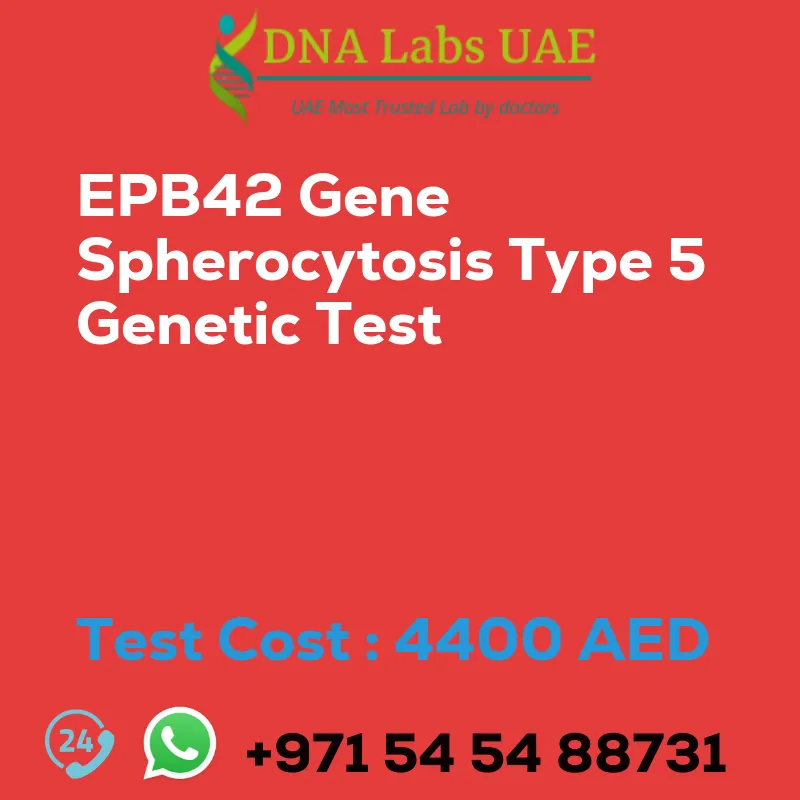EPB42 Gene Spherocytosis type 5 Genetic Test
At DNA Labs UAE, we offer the EPB42 Gene Spherocytosis type 5 Genetic Test at a cost of 4400.0 AED. This test is designed to analyze the EPB42 gene and detect any mutations or genetic variants that may be associated with spherocytosis type 5.
Test Components and Price
Components: EPB42 Gene Spherocytosis type 5 Genetic Test
Price: 4400.0 AED
Sample Condition
Sample can be either Blood, Extracted DNA, or One drop Blood on FTA Card.
Report Delivery
Reports will be delivered within 3 to 4 weeks.
Method
The EPB42 Gene Spherocytosis type 5 Genetic Test utilizes NGS (Next-Generation Sequencing) technology.
Test Type
This test falls under the category of Hematology.
Doctor
The test will be conducted by a Hematologist.
Test Department
The test is conducted in the Genetics department.
Pre Test Information
Prior to the test, it is important to provide the clinical history of the patient who is undergoing the EPB42 Gene Spherocytosis type 5 NGS Genetic DNA Test. Additionally, a Genetic Counselling session will be conducted to draw a pedigree chart of family members affected by the EPB42 gene.
Test Details
The EPB42 gene is associated with spherocytosis type 5, a condition characterized by the presence of spherical-shaped red blood cells (spherocytes) instead of the normal biconcave shape. This condition is caused by mutations in the EPB42 gene, which encodes a protein called erythrocyte membrane protein band 4.2. This protein plays a crucial role in maintaining the shape and stability of red blood cells.
NGS technology allows for the simultaneous sequencing of multiple genes or even the entire exome (the protein-coding regions of all genes) in a cost-effective and efficient manner. By performing an NGS genetic test for spherocytosis type 5, healthcare providers can identify individuals who are at risk of developing the condition or confirm a diagnosis in individuals with suspected spherocytosis. This information can be used for genetic counseling, family planning, and management of the condition.
It is important to note that genetic testing should be performed by a qualified healthcare professional or genetic counselor who can interpret the results and provide appropriate recommendations based on the individual’s specific situation.
| Test Name | EPB42 Gene Spherocytosis type 5 Genetic Test |
|---|---|
| Components | |
| Price | 4400.0 AED |
| Sample Condition | Blood or Extracted DNA or One drop Blood on FTA Card |
| Report Delivery | 3 to 4 Weeks |
| Method | NGS Technology |
| Test type | Hematology |
| Doctor | Hematologist |
| Test Department: | Genetics |
| Pre Test Information | Clinical History of Patient who is going for EPB42 Gene Spherocytosis type 5 NGS Genetic DNA Test. A Genetic Counselling session to draw a pedigree chart of family members affected with EPB42 Gene Spherocytosis type 5 NGS Genetic DNA Test gene EPB42 |
| Test Details |
The EPB42 gene is associated with a condition called spherocytosis type 5. Spherocytosis is a group of inherited disorders characterized by the presence of spherical-shaped red blood cells (spherocytes) instead of the normal biconcave shape. Spherocytosis type 5 is caused by mutations in the EPB42 gene, which encodes a protein called erythrocyte membrane protein band 4.2. This protein is involved in maintaining the shape and stability of red blood cells. A Next-Generation Sequencing (NGS) genetic test can be used to analyze the EPB42 gene and detect any mutations or genetic variants that may be associated with spherocytosis type 5. NGS technology allows for the simultaneous sequencing of multiple genes or even the entire exome (the protein-coding regions of all genes) in a cost-effective and efficient manner. By performing an NGS genetic test for spherocytosis type 5, healthcare providers can identify individuals who are at risk of developing the condition or confirm a diagnosis in individuals with suspected spherocytosis. This information can be used for genetic counseling, family planning, and management of the condition. It is important to note that genetic testing should be performed by a qualified healthcare professional or genetic counselor who can interpret the results and provide appropriate recommendations based on the individual’s specific situation. |








